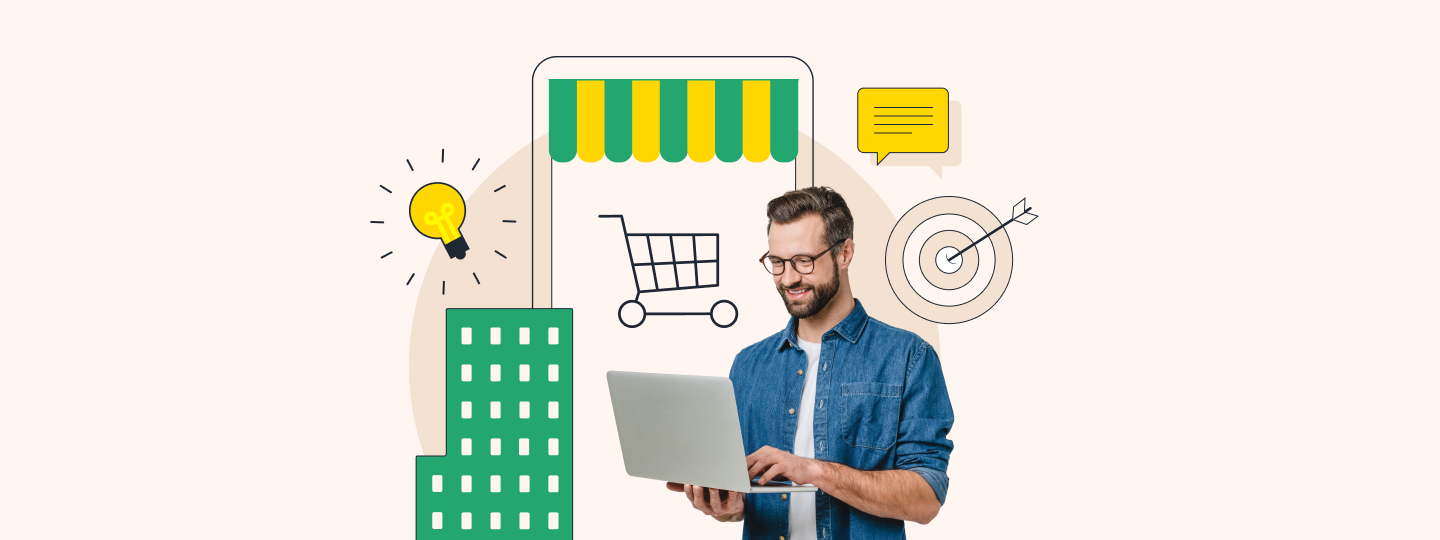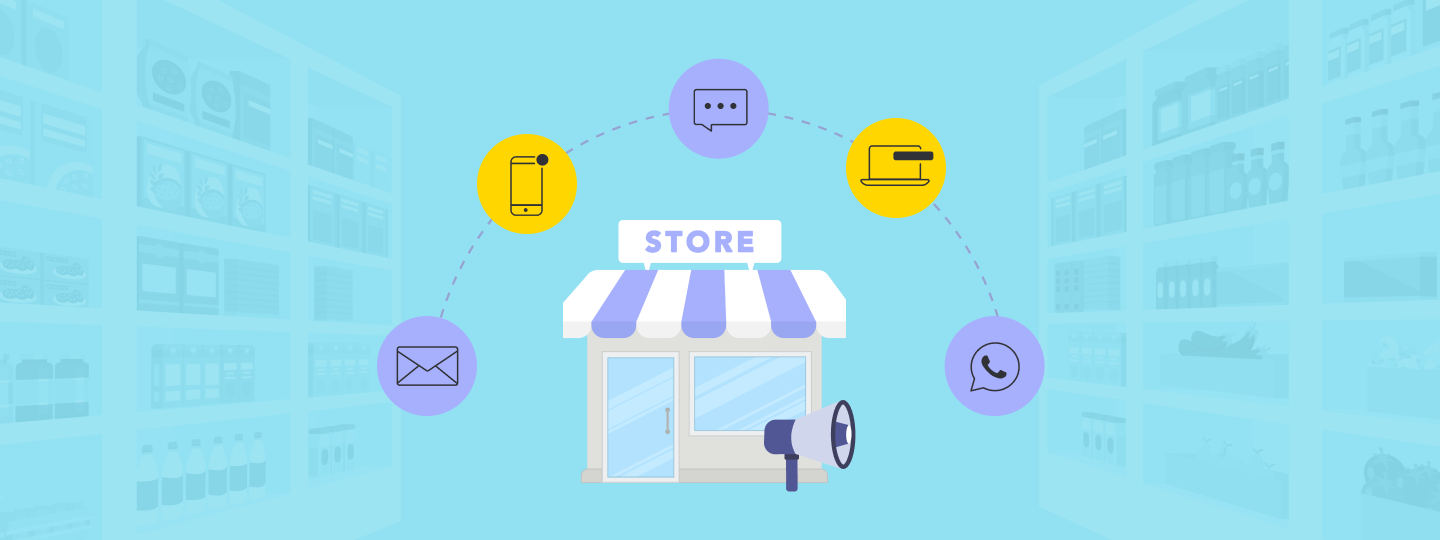In the past couple of years, there has been a significant increase in the number of businesses using WhatsApp for communicating with customers and running marketing campaigns.
In 2021, almost 50 million businesses were using WhatsApp as a marketing channel. This number skyrocketed in 2022, with more than 500 million businesses using WhatsApp.
And so many companies using WhatsApp as their go-to marketing shows that it must be effective. But is it for all of them?
Well, the truth is not all businesses are able to see the best results from this channel. And the primary reason behind this is that many businesses are not fully aware of WhatsApp’s features, capabilities, and opportunities.
With this comprehensive WhatsApp marketing guide, we aim to address this knowledge gap by providing valuable insights into WhatsApp marketing, its benefits, different campaign types, and how to choose the right WhatsApp marketing platform.
By the end of this WhatsApp marketing guide, you will be better equipped to leverage WhatsApp for marketing and engage effectively with your target audience.
Let’s dive right in!
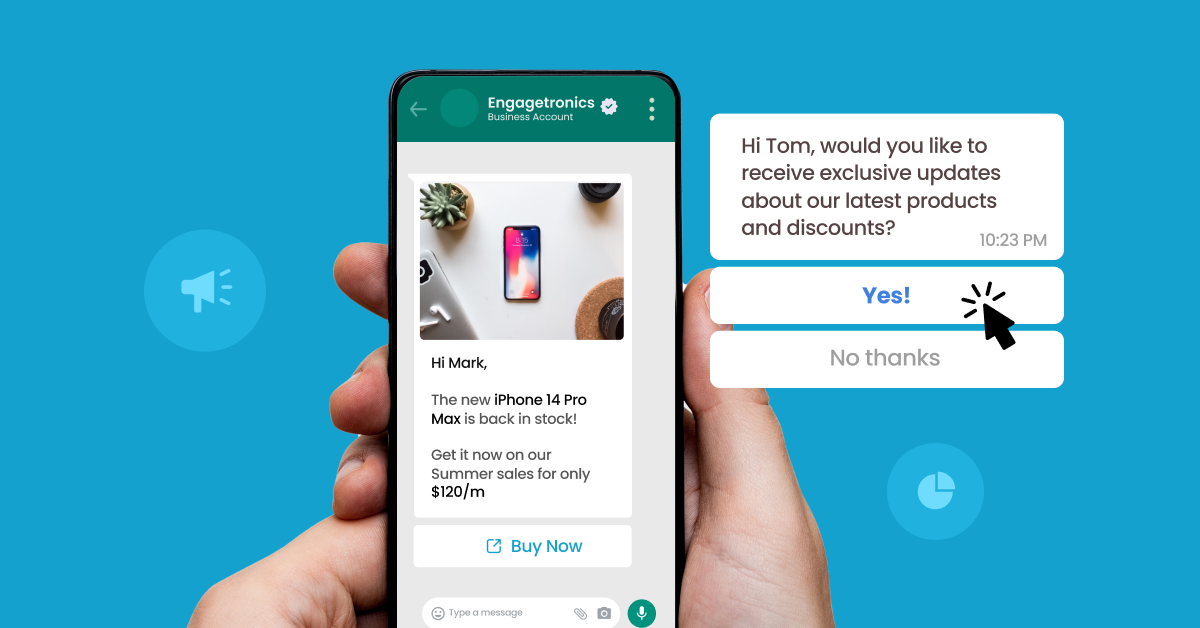
What is WhatsApp marketing?
When we talk about WhatsApp marketing, we talk about using one of the popular messaging platforms, WhatsApp, to promote your products or services, engage with customers, and achieve various marketing objectives.
WhatsApp marketing involves creating and distributing engaging content, running targeted campaigns, and implementing different marketing strategies to reach out to your target audience through the messaging app.
And with more than 2 billion monthly active users and over 1 billion daily active users, this platform presents businesses with a unique opportunity to establish personal connections with customers and drive meaningful interactions.
What are the benefits of WhatsApp marketing?
In addition to the massive user base, WhatsApp also boasts an open rate of 98%, which is far more than channels like email. And there are many more reasons why you should consider using WhatsApp as your go-to marketing channel.
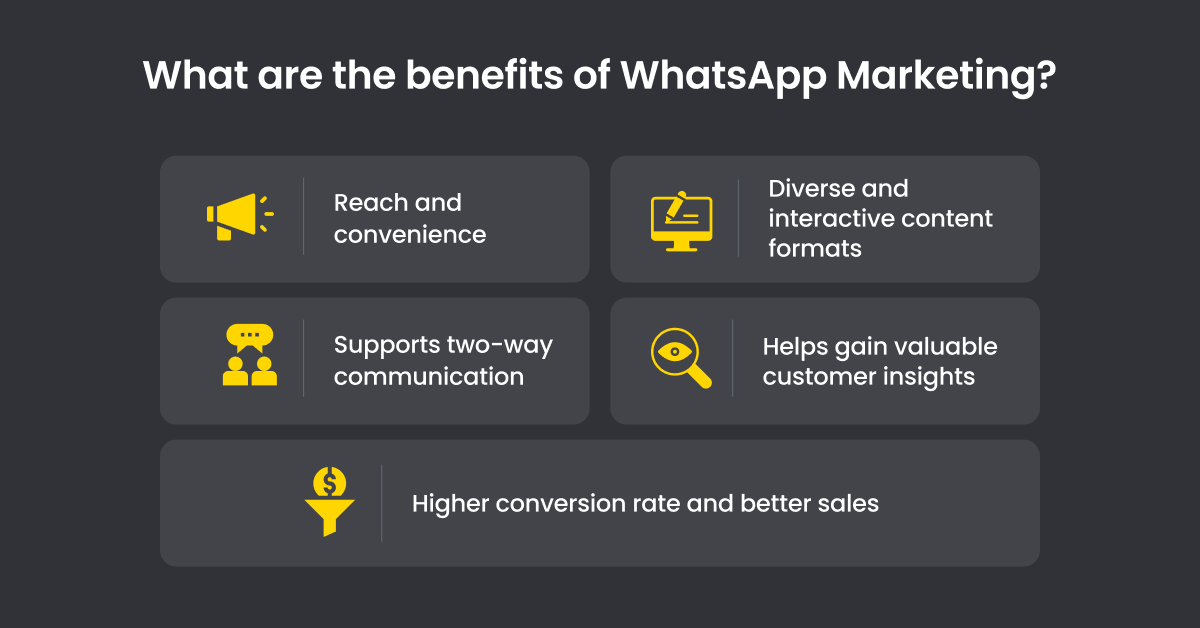
Here are some more:
1. Reach and convenience
One of the biggest advantages of using WhatsApp for marketing is its incredible reach and convenience.
Let’s face it, we’ve all been swamped with promotional emails in our inboxes, and sometimes it’s just too much to handle. As a result, the open rates for marketing emails have been decreasing, and businesses struggle to connect with their customers.
But that’s not the case with WhatsApp. It’s one of the most used apps in the world and almost all the messages are read by the recipients.
WhatsApp also allows you to reach your audience in a more personal and conversational manner. This approach not only strengthens the connection between the brand and its customers but also helps businesses scale their marketing efforts effectively as they grow.
2. Diverse and interactive content formats
The WhatsApp Business app provides a wide range of content formats and interactive options for business messaging. You can send lists, CTAs, links, images, videos, attachments, and even product options that recipients can interact with.
The platform also supports longer messages (up to 1,000 characters), making it comparable to traditional email marketing. Other features include autoresponders, shareable product catalogs, chatbots, and contact management.
3. Supports two-way communication
With WhatsApp, you can enable seamless two-way communication between you and your customers. This convenience allows customers to proactively reach out for customer service, increasing the chances of gaining and retaining their business. In fact, 53% of customers prefer shopping from companies they can message directly.
4. Helps gain valuable customer insights
Knowledge is power. Well, when it comes to marketing, understanding your customers and their preferences can make a world of difference in the success of your campaigns. WhatsApp Business has a fantastic feature that does just that — the “Statistics” section.
Let’s say, you’re running a marketing campaign, and you want to know how well it’s performing. With the WhatsApp Business “Statistics” feature, you can access data on messages sent, delivered, received, and even read. This treasure of information allows you to gauge the effectiveness of your campaigns and make data-driven decisions.
Moreover, you can also analyze these statistics to identify when your customers are most active on WhatsApp, which helps you optimize your promotional campaigns for maximum engagement. For instance, if you discover that most of your customers read messages during lunch breaks or after work, you can tailor your campaign schedule accordingly.
5. Higher conversion rate and better sales
WhatsApp marketing can also serve as a convenient reminder for clients and nudges potential buyers towards making purchases. Studies show that messaging after initial contact with prospects can boost conversion rates by 112.6%.
Moreover, WhatsApp marketing has also proven to be effective in driving sales, with a simple tactic such as adding your WhatsApp number to your webpage, you can see a 27% increase in sales leads.
Around 66% of individuals feel more confident buying from brands active on messaging apps, and 60% of customers believe they’ll use messengers like WhatsApp for purchasing in the future.
WhatsApp can also function as a stand-alone sales channel, especially as customers increasingly rely on messaging apps for purchases.
Types of WhatsApp marketing campaigns
There’s no limitation to the types of marketing campaigns you can run on WhatsApp. Be it creating awareness or getting feedback — WhatsApp marketing campaigns can do it all.
Here are some of the many types of WhatsApp marketing campaigns to give you a headstart:
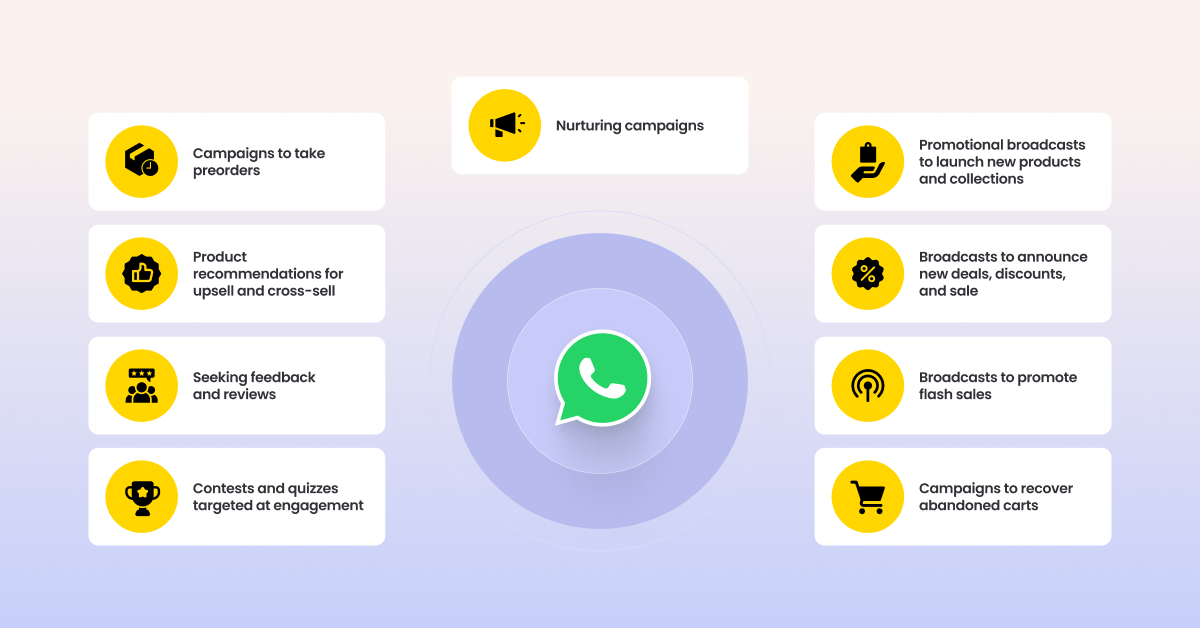
1. Promotional broadcasts to launch new products and collections
The high open rate of WhatsApp makes it an amazing platform to spread the word about new products or collections. Sending a message to your customers when you’re launching something new helps build excitement and anticipation among them. And, the best part? This excitement often leads to higher conversions!
So, how can you run a campaign like this? It’s pretty simple. Start by sharing eye-catching images, captivating videos, and irresistible descriptions of your new products. For instance, if you’re a clothing brand, you can create sizzling videos of models rocking your latest seasonal collection, along with a link to the online store.
Then you have to create a broadcast list of customers who’d love to know about your new offerings and send them the promotional content. Also, don’t forget to include a clear call-to-action, like “Check out the new collection now!”
Your audience will be thrilled to explore what you’ve got in store.
2. Broadcasts to announce new deals, discounts, and sale
Do you know what gets people most excited to buy new products? Sales and discounts! As a matter of fact, in a survey, 57% of customers agreed that had they not received a discount, they wouldn’t have purchased the product.
And WhatsApp, with its broadcast feature, is one of the best ways to let your customers know about those irresistible deals.
💡 Pro-Tip: when you’re broadcasting sale info, it’s crucial to target the right audience. For example, if you’re running a sale on kids’ products, it makes sense to send the message only to parents, maybe those above the age of 25. There’s no point in sending it to teenagers, as the chances of converting them are pretty slim.
So, let’s say you’re a local restaurant offering a 20% discount on meals during specific off-peak hours. You could send a WhatsApp broadcast like this to your subscribers:
“Hey there! Enjoy a 20% discount on all meals between 2-5 PM, Monday to Friday. Hurry, this offer is valid for a limited time only! To claim your discount, simply show this message to our staff. See you soon! 😊”
Here’s how Ustraa, a men’s grooming brand, does it:
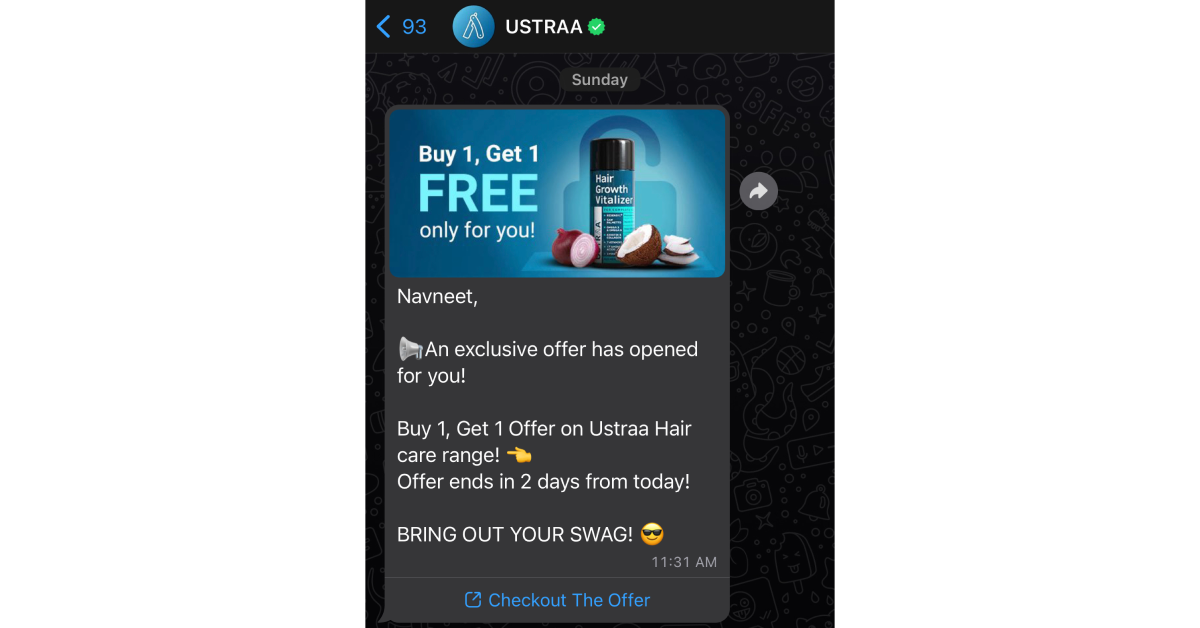
3. Broadcasts to promote flash sales
Flash sales create a sense of urgency, nudging customers to act quickly and grab those awesome deals. But, just like with any WhatsApp broadcast message, the spray-and-pray approach won’t cut it here. To make your flash sale broadcasts more effective, you need to be strategic with your customer segmentation.
Before hitting send, make sure your customer list is segmented according to categories, gender, or even age. This way, you can ensure that a customer interested in men’s products doesn’t get a WhatsApp broadcast loaded with women’s items.
When people receive irrelevant flash sale messages, the effectiveness of those broadcasts takes a nosedive. But with a segmented list, you can send the exact product images that get customers pumped and ready to shop.
Of course, your message must highlight the time-sensitive nature of the sale. Here’s an example template that’ll get your customers moving:
⏰ Flash Sale Alert! Get 50% off on your favorite gadgets for the next 2 hours ONLY! Hurry, shop now, and don’t miss out on these amazing deals! 👉 [link to the sale]
A message like this, with a powerful call-to-action, will drive customers to act quickly and make the most of your flash sale.
4. Campaigns to recover abandoned carts
Did you know that the average cart abandonment rate across industries is a whopping 70%? That’s right! These are customers who already know your brand and products but bailed out for one reason or another. If you’re not making an effort to bring them back, you’re leaving a huge chunk of potential business on the table. And that’s where WhatsApp comes to the rescue.
WhatsApp can be a game-changer when it comes to recovering abandoned carts. By sending personalized reminders with details of the items left in the cart, you can gently nudge customers to complete their purchases. You could even sweeten the deal by offering a small discount or free shipping as an incentive — just like how Traya, a hair care brand, does it.
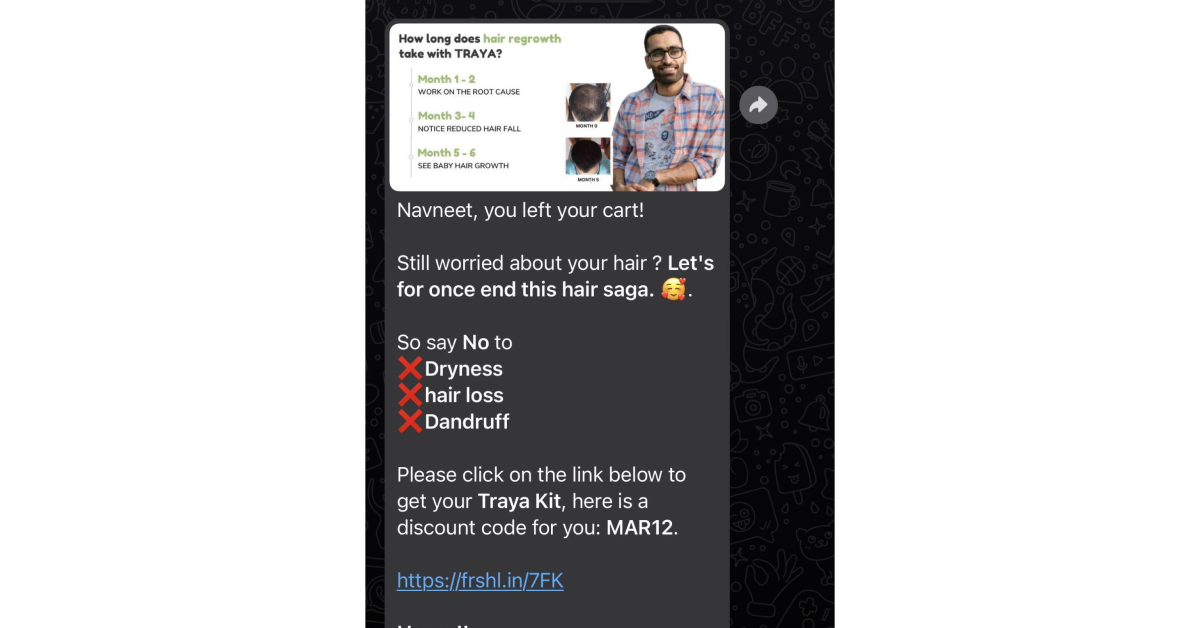
You can integrate your e-commerce platform with your WhatsApp marketing platform. This will help you identify abandoned carts and automate those crucial reminder messages. With a well-executed WhatsApp campaign coupled with automation, you’ll see those cart abandoners transform into happy customers in no time.
5. Campaigns to take preorders
And why just recover abandoned carts when we can also take orders in advance? Promoting upcoming products and accepting pre orders through WhatsApp can create anticipation and excitement among your customers.
The best part is that WhatsApp even comes with a built-in payment feature, making it super easy for your customers to pay securely for their orders right from the app.
Let’s say you’re launching a limited-edition sneaker line. You could use WhatsApp to send a message showcasing the sneakers with eye-catching images, enticing descriptions, and pricing details. Then, hit them with a call-to-action to pre order directly through WhatsApp. It’s also a great way to predict the demand for your product, helping you manage your inventory more effectively.
Of course, to pull this off successfully, you’ll need to set up a system that handles pre orders and payments seamlessly. This ensures your customers have a smooth experience from start to finish.
Here’s how JioMart does it:
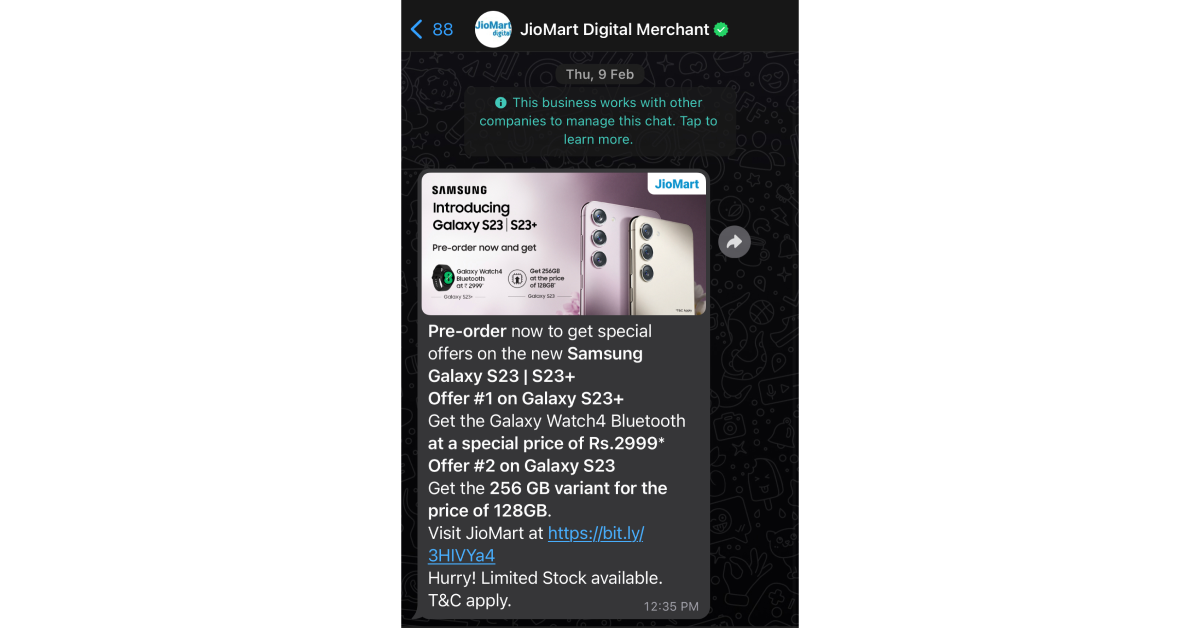
6. Product recommendations for upsell and cross-sell
Upselling is when you encourage a customer to buy a higher-priced item, while cross-selling is recommending complementary products to what they’ve already purchased or shown interest in. Both strategies can boost sales and customer satisfaction when done right, and WhatsApp marketing can really help make the execution easier for you.
You can start by analyzing your customers’ purchase history, preferences, and browsing behavior to send them personalized product recommendations that encourage either upselling or cross-selling. This tailored approach makes customers feel valued, and they’re more likely to take action on your recommendations.
For example, if you’re a skincare brand and a customer recently bought a facial cleanser, you could cross-sell by recommending a complementary toner or moisturizer. For upselling, if they were browsing a standard product, you might suggest a premium, more expensive version with additional benefits.
To pull off this WhatsApp marketing campaign effectively, you can integrate your customer data with your WhatsApp marketing software to create targeted, personalized messages that hit the mark and drive those extra sales.
7. Seeking feedback and reviews
Requesting feedback and reviews from customers is one of the most crucial tasks of running a business. These reviews actually help you improve your products or services and build trust with customers.
You can use WhatsApp’s quick reply feature or create a simple landing page to collect responses.
For example, a hotel could send a message asking guests to rate their stay and provide feedback on their experience. You can then use the collected feedback to identify areas for improvement and can also showcase positive reviews on your website or social media to help other customers feel confident about purchasing from you.
Here’s how MakeMyTrip asks for feedback when a customer cancels the booking:
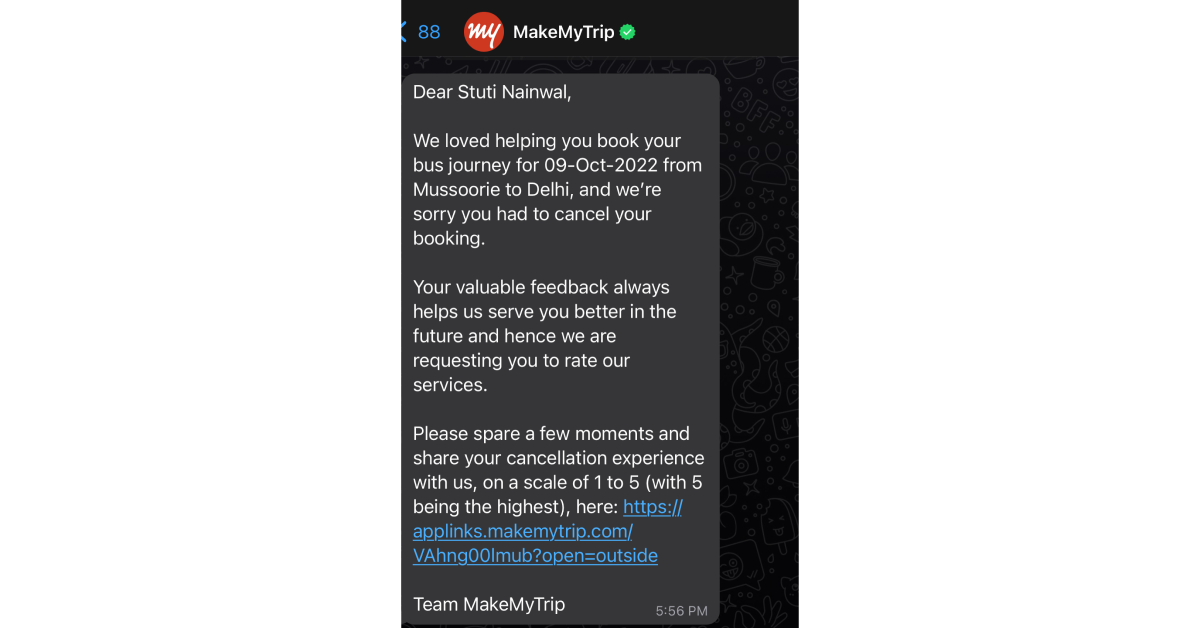
8. Contests and quizzes targeted at engagement
You can also host contests or quizzes on WhatsApp to encourage customer interaction and reward those who participate.
For example, if you sell books online, you could organize a literary trivia quiz, offering exclusive discounts or free merchandise to the winners.
All you have to do to run such contests is create interesting and fun questions and set up a system to track participants and their responses. Once you have a winner, let everyone know, and send a personalized message to the winner informing them how they can redeem their prize.
9. Nurturing campaigns
And last but not least — nurturing campaigns. These campaigns are essential for maintaining communication with customers who have shown interest in your brand. WhatsApp can be used as a mini newsletter format to keep your audience engaged and informed, even after their initial interaction with your business.
You can share helpful content, tips, or industry news your audience finds valuable. This not only helps build trust and rapport but also positions your brand as an expert in the field.
For instance, if you’re a fitness brand, you could send periodic messages with workout tips, healthy recipes, or motivational quotes to keep your subscribers engaged and inspired.
Remember, providing value without being overly promotional is key to a successful nurturing campaign. This way, when your customers are ready to make a purchase, your brand will be the first one that comes to their minds.
Steps to get started with WhatsApp marketing
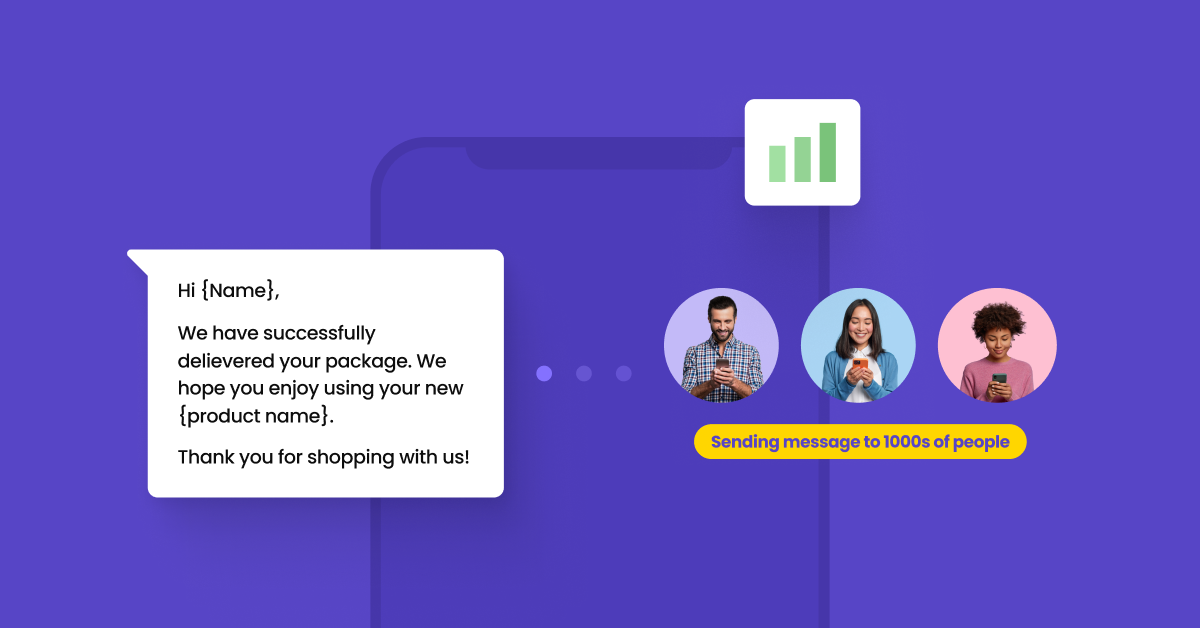
WhatsApp marketing is one of the most powerful tools for businesses to connect with their customers in an engaging way. However, you can’t just start a campaign on WhatsApp without understanding the process and the best practices.
Here are some steps you can follow to ensure that your campaigns are effective and deliver the desired results:
1. Understand different types of campaigns
So, you’ve made up your mind and want to use WhatsApp for marketing. But before you get started, you need to understand the different campaign types available.
WhatsApp has options like interactive messages, broadcasts, and more. When you have a good understanding of each type, you can pick the perfect campaign to achieve specific actions from your customers.
For example, let’s say your goal is to boost engagement; you should probably choose an interactive message campaign over a broadcast.
2. Set a business goal/objective and define your KPI
Before you jump into creating a campaign, it’s essential to have a clear goal in mind. Why? Well, without a goal, you won’t know whether your campaign is effective or not.
Defining KPIs will help you track your progress and make the necessary adjustments to improve your campaigns. Remember, a WhatsApp campaign without a goal is like sailing without a compass; you won’t go far.
3. Create your business profile
First impressions last. And that’s why it’s crucial to make your WhatsApp profile look professional and trustworthy. With the rise in scams, customers don’t engage with profiles that look sketchy. To create a legit-looking profile, add your business logo, use a verified phone number, and provide accurate information about your company.
4. Build your WhatsApp list
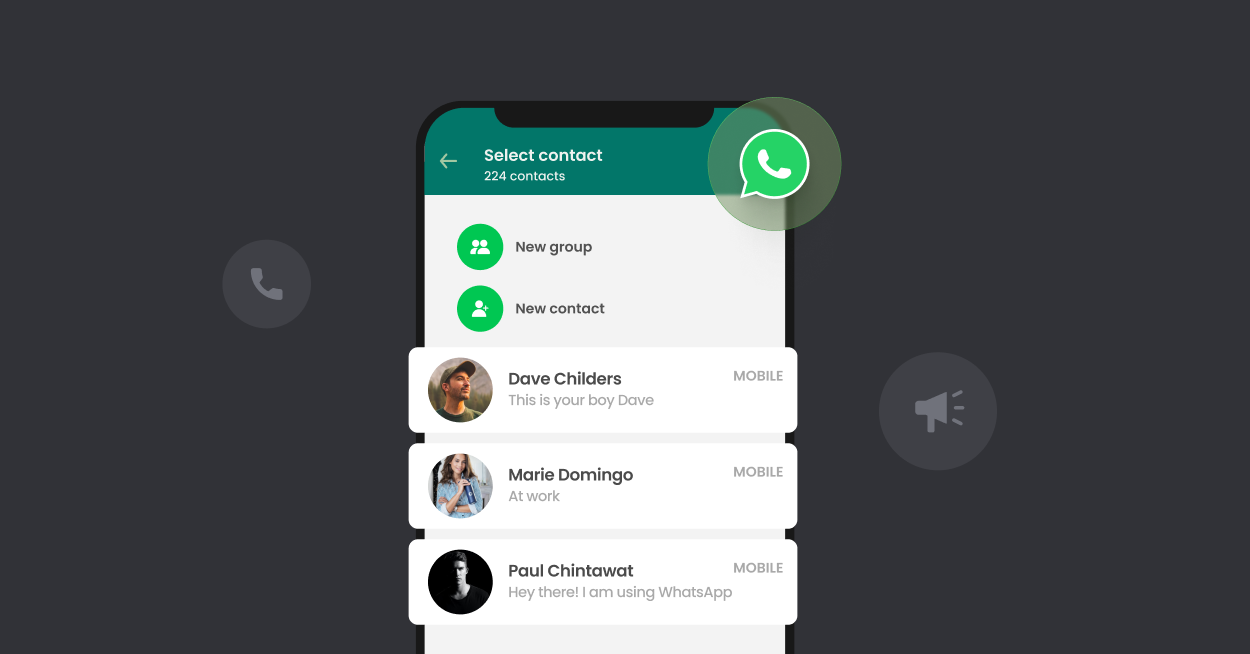
Growing your WhatsApp contact list is akin to expanding your marketing reach. The more people you have on your list, the more potential customers you can engage with.
You can employ various strategies and best practices to encourage people to opt in. Here are some of them:
- Incentivize subscriptions: Offer exclusive discounts, promotions, or access to valuable content in exchange for users subscribing to your WhatsApp list. This gives people a compelling reason to join your contact list.
- Leverage your website: Add a WhatsApp opt-in form to your website, making it easy for visitors to sign up for updates or newsletters. To increase the form’s visibility, you can place it on your homepage, blog, or other high-traffic pages.
- Promote on social media: Use your social media channels to drive opt-ins by sharing your WhatsApp number or a link to your opt-in form. Create engaging posts highlighting the benefits of subscribing to your lists, such as exclusive offers, tips, or behind-the-scenes content. Including QR codes in your posts can be a game-changer to make opting in easier for your audience, and you’ll also be able to track the conversions.
- Click-to-WhatsApp ads: Run targeted ads on platforms like Facebook or Instagram, including a “click-to-WhatsApp” button. When users click the button, they’ll be redirected to a WhatsApp chat with your business, making it easy to opt in and start a conversation.
5. Choose a WhatsApp Service Provider to set up automation
We’re living in a world of AI and automation. And it’s crucial to keep up with the pace and leverage technology for your WhatsApp marketing.
Automating your campaigns helps you stay ahead of the competition and ensures that you’re making the most of your efforts. If you still manage everything manually, you’ll be left far behind.
A WhatsApp Service provider (WSP) plays a vital role in automating your marketing efforts. They offer a set of tools and services that allow you to integrate WhatsApp messaging with your existing systems and applications. This integration enables you to automate message sending, receive and process customer responses, and even set up chatbots for handling common inquiries.
By working with service providerprovider, you can streamline your campaigns, maintain consistent communication with your audience, and focus on more strategic tasks. But how do you choose the right WSP for your needs? Don’t worry; we’ll cover that later in the blog to help you make an informed decision.
6. Create content as per the stage of the consumer
Content is king, and it’s essential to tailor your content based on your customer’s stage in their buyer journey.
For example, if a customer has just discovered your brand, nurture them with informative content. On the other hand, if they’re already familiar with your products or services, entice them with personalized offers or recommendations.
It’s a good practice to mix up your content with images, media files, PDFs, and videos based on your customers’ stage to keep things fresh and engaging.
7. Automate your campaigns
As we mentioned earlier, automation is essential for maximizing the effectiveness of your WhatsApp marketing campaigns. By automating various aspects of your campaigns, you can achieve better results while saving time and resources.
Here are some key reasons to automate your campaigns:
- Efficiency: Automation helps you manage high volumes of messages without the need for manual intervention, enabling you to respond to customer queries quickly and consistently.
- Personalization: With automated campaigns, you can segment your audience based on interests, preferences, or past interactions and send tailored messages to each group, making your communications more relevant and engaging.
- Scalability: As your WhatsApp contact list grows, automation allows you to maintain high-quality communication with your customers without additional manpower, ensuring your campaigns can scale alongside your business.
- Data-driven insights: Automated campaigns generate valuable data, which can be analyzed to optimize your marketing strategies, helping you make more informed decisions and improve your overall performance.
8. Measure and optimize
This is all you need to set up your campaign. But your work isn’t over yet. To make the most of your WhatsApp marketing efforts, it’s essential to monitor your campaigns’ performance regularly. You need to keep an eye on your KPIs and analyze the data to determine what’s working and what’s not.
WhatsApp marketing is an iterative process, which means you’ll need to make adjustments to keep your campaigns relevant to your audience. Don’t be afraid to tweak your content, targeting, or messaging based on your performance insights. By continuously optimizing your campaigns, you’ll not only improve your results but also build stronger relationships with your customers.
How to choose a WhatsApp Service Provider?
In this WhatsApp marketing guide, almost all the elements we discussed are free to get started with. However, to fully harness the potential of WhatsApp marketing, you need to utilize automation.
Automations allow you to scale your efforts and engage with your audience in a more personalized and efficient manner. And for automation, you need to opt for the WhatsApp Business API.
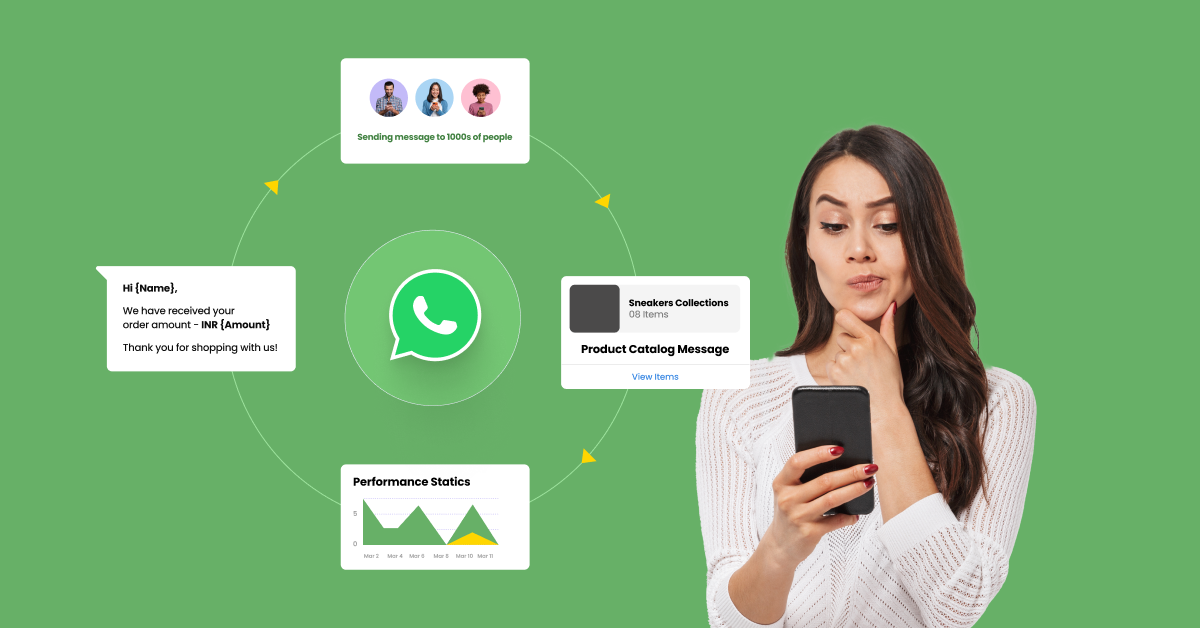
In this section, we’ll dig into some factors that you should consider while choosing a WhatsApp service provider:
1. Integration with Your CMS and Official WhatsApp Business API
A seamless integration between your Content Management System (CMS) and the messaging app is essential for smooth data flow. This lets you sync customer information, purchase history, and other relevant data with the WhatsApp Business API.
Also, ensure that the provider is an official partner of the WhatsApp Business API, as this guarantees faster and more efficient data transfer. It’s essential because indirect integrations may lead to slower and less reliable performance.
2. Ease of Use
Choose a WhatsApp service provider with an intuitive and user-friendly interface that makes it easy for you to create and manage campaigns, even if you have limited technical expertise.
The platform should allow you to quickly set up broadcasts, segment your audience, and monitor campaign performance without requiring extensive training or support.
3. Customer Support
You should opt for a WSP that offers responsive and reliable customer support. This can include live chat, email, or phone support to help you troubleshoot any issues that may arise. Additionally, the WSP should also have comprehensive resources such as documentation, tutorials, and FAQs to assist you in setting up and optimizing your WhatsApp marketing campaigns.
4. Workflows and Automation
The WhatsApp service provider should offer a variety of workflows and automation to help you create targeted campaigns that cater to different customer segments and marketing objectives. This enables you to run promotional broadcasts and other marketing campaigns, such as abandoned cart recovery, upselling, and cross-selling, tailored to your business needs.
5. WhatsApp Templates
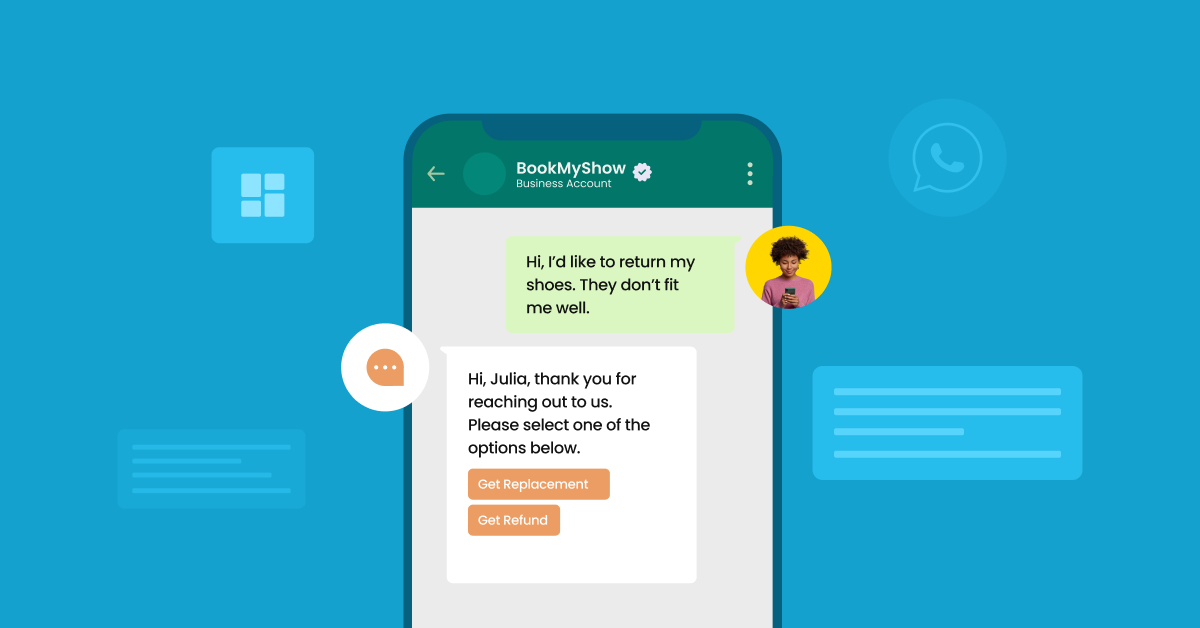
WhatsApp service providers often need to get message templates whitelisted by Meta; the approvals can take anywhere between 3-5 days. A good WhatsApp Business API provider should have ready-to-use and customizable WhatsApp templates or should at least offer assistance in creating and getting your templates approved by WhatsApp. This can save you time and ensure that your messages adhere to WhatsApp’s guidelines, maximizing the effectiveness of your campaigns.
6. Integrations with Other Channels
As omnichannel marketing becomes increasingly important, choose a provider that offers integrations with other communication channels, such as push notifications, email, SMS, and social media platforms. This allows you to effectively manage and coordinate your omnichannel marketing efforts.
7. Analytics
Once you start leveraging WhatsApp marketing, it’s essential to monitor the campaigns’ performance. Choose a WhatsApp service provider that offers in-depth analytics, including not just open and click-through rates but also engagement rates, conversions, and sales. This will help you optimize your campaigns and make data-driven decisions, which is beneficial in the long run.
8. Service Cost of Provider
Ensure that the WhatsApp service provider you choose is transparent about its pricing and provides a clear breakdown of all associated costs.
You can start by comparing different providers’ pricing models, such as one-time fees versus monthly subscriptions, and choose the one that best suits your budget and needs.
You must conduct an independent review to determine if the provider is honest and transparent about their pricing.
9. Demo and Free Trial
Opt for a provider that offers a demo and a free trial period. This allows you to test the platform’s features, evaluate its ease of use, and determine whether it meets your business requirements before committing to a long-term contract.
10. Resources
And finally, choose a WhatsApp service provider that has a wealth of resources, such as blogs, success stories, and a knowledge base for self-serve learning. This can help you stay updated on the latest trends in WhatsApp marketing, learn best practices, and get inspired by other businesses’ success stories.
Choose the best WhatsApp Marketing Platform for your business
Now that you understand the immense potential of WhatsApp marketing, it’s time to get started and make the most of this powerful platform.
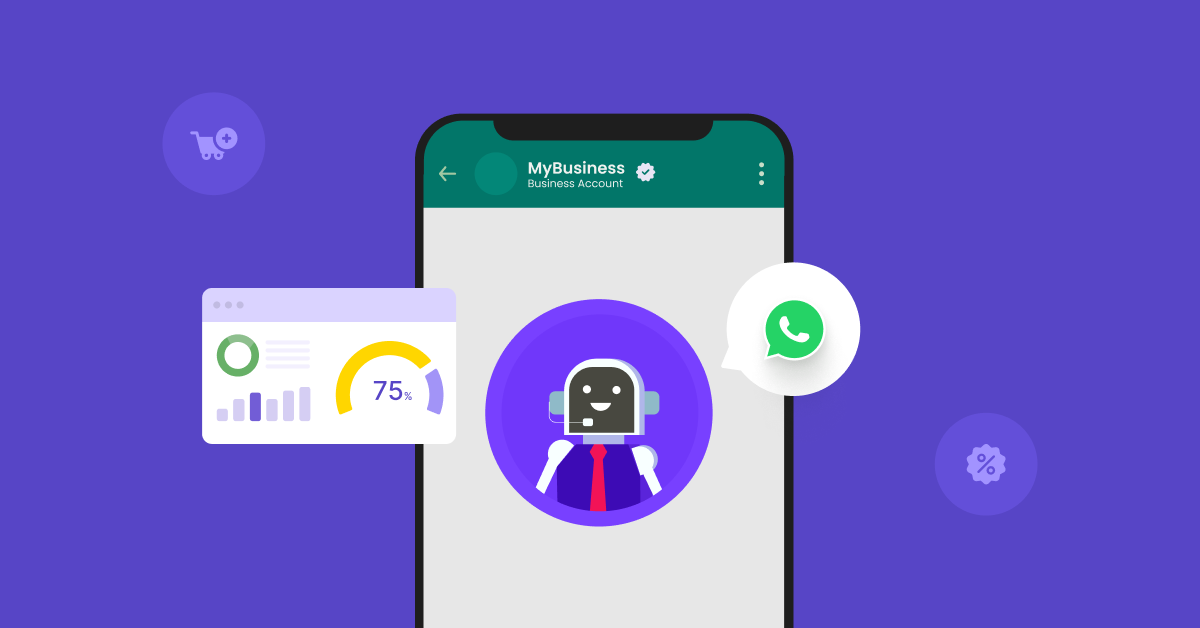
Keep in mind that the early adopters who tap into the full capabilities of WhatsApp Business can gain a significant edge over their competitors and see remarkable results in their marketing campaigns.
Therefore, choosing the right solution for using the WhatsApp Business API is a crucial step in ensuring it’s seamlessly integrated into your marketing strategy. From broadcasts and promotions to automation and personalized customer interactions, a reliable and user-friendly solution can make all the difference.
WebEngage is a powerful marketing automation platform that partners with authorized WhatsApp service providers to help you run campaigns on the messaging platform. This ensures you can make your WhatsApp campaigns work in tandem with other channels, leading to better results from marketing.



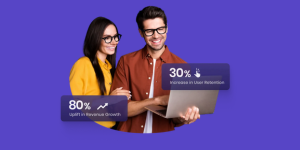
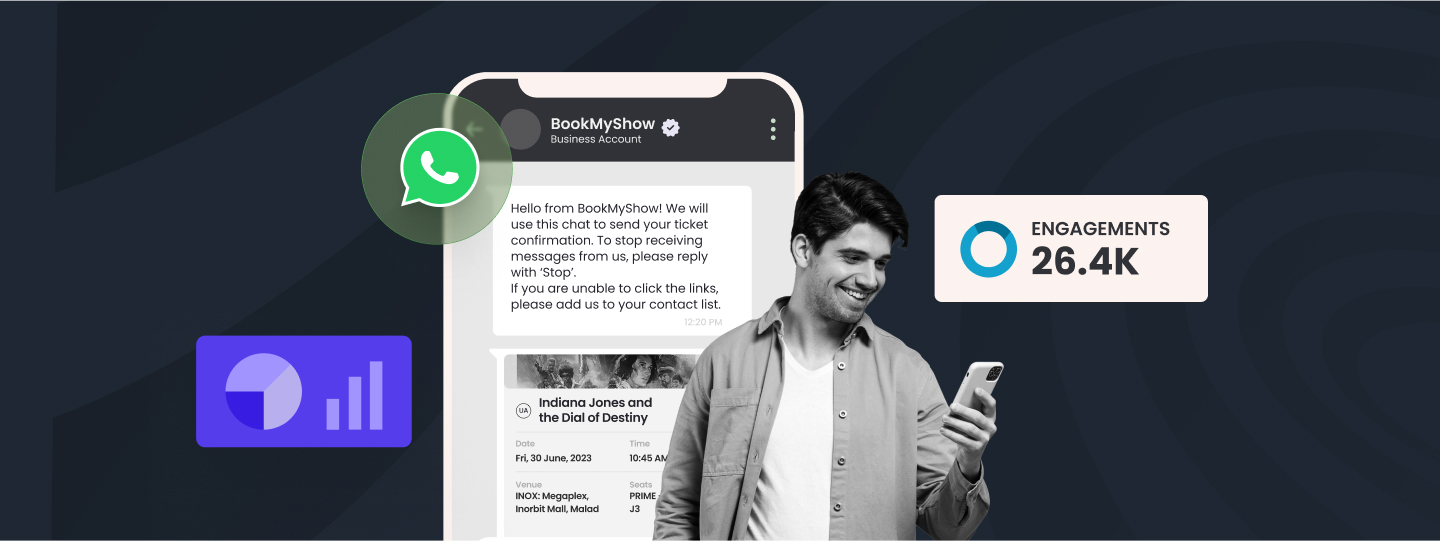

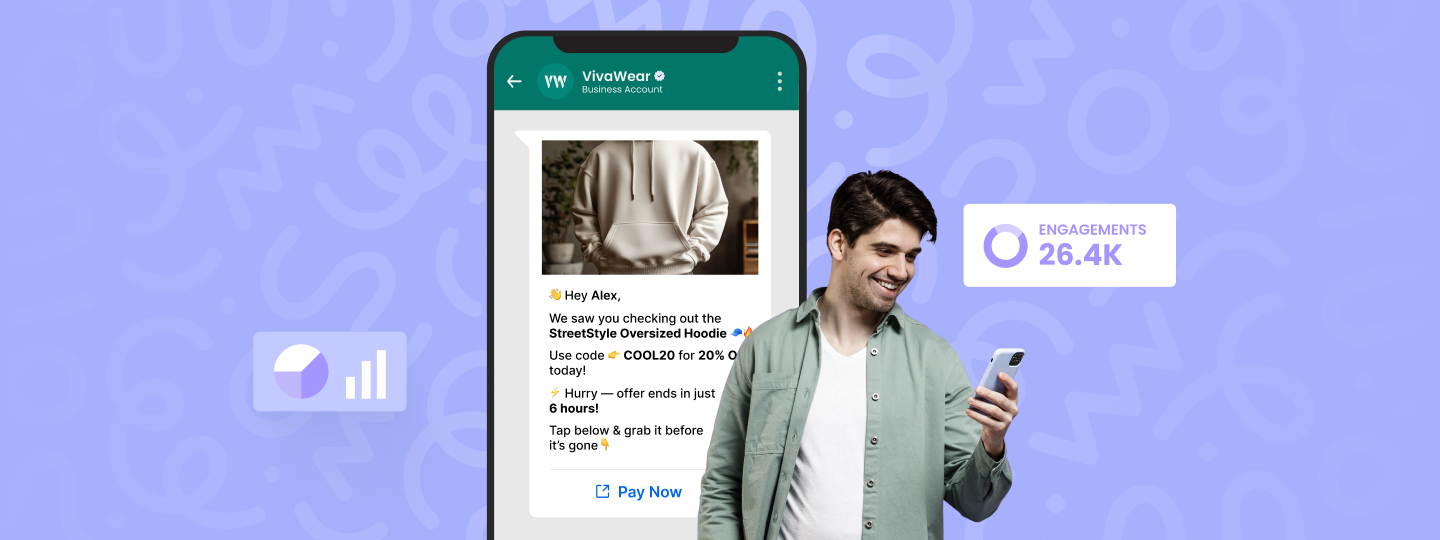
 Prakhya Nair
Prakhya Nair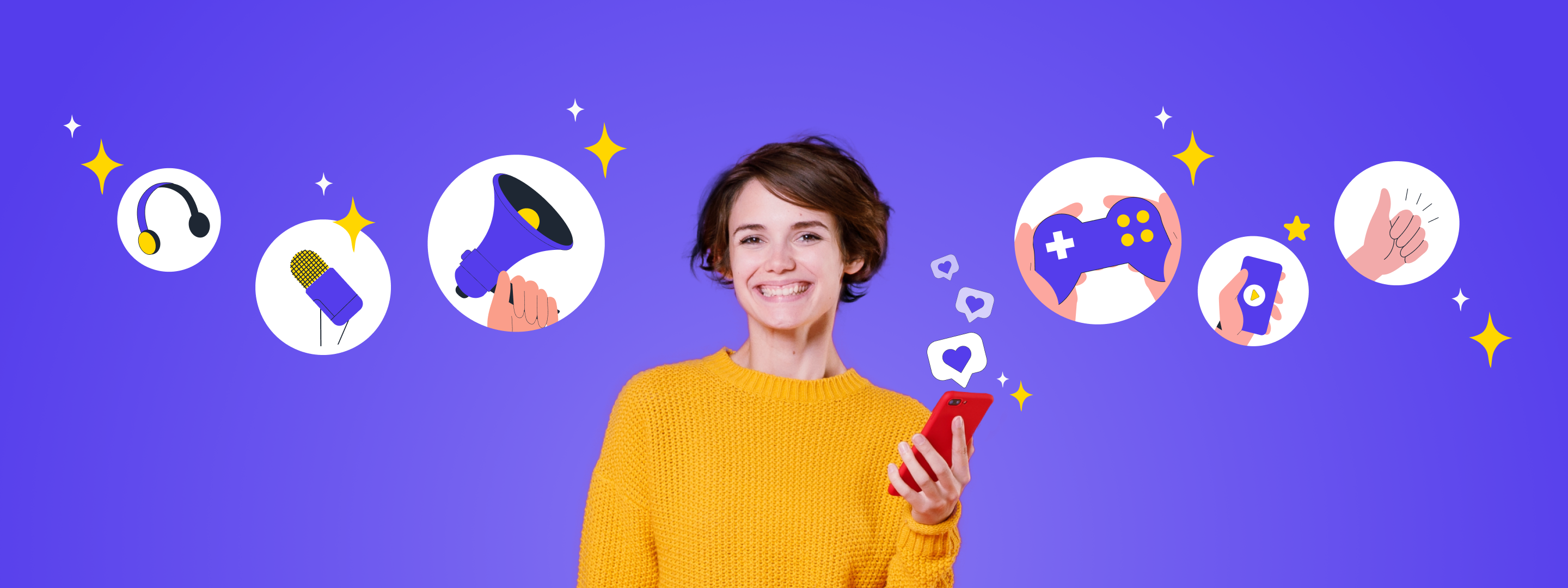
 Diksha Dwivedi
Diksha Dwivedi